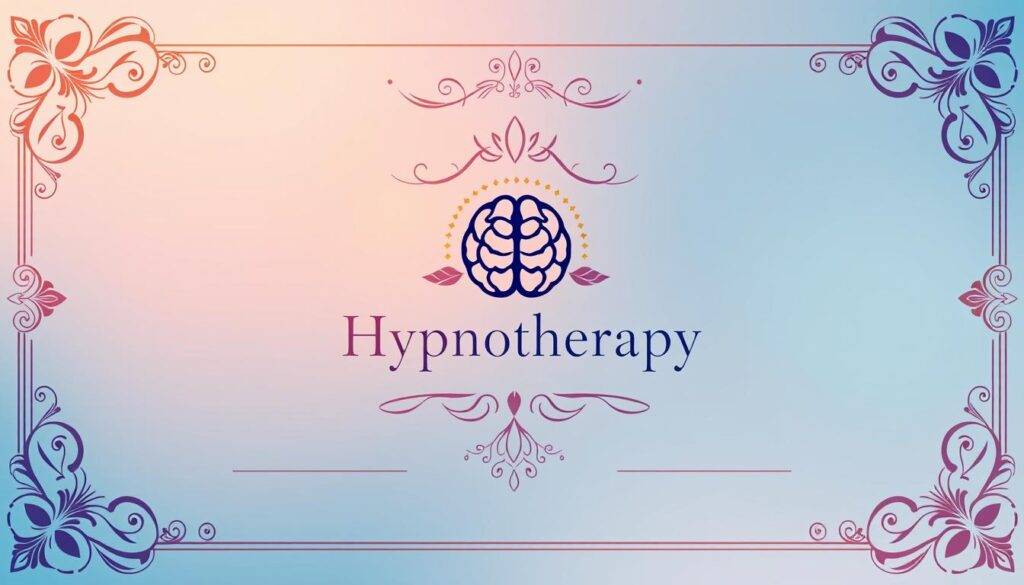“The mind is everything. What you think you become.” – Buddha
Depression affects about 5% of the world’s population, says the World Health Organization (WHO). Many try therapy and medication to find relief. Hypnotherapy is another option that can help.
Hypnotherapy, or hypnosis, helps you focus deeply. It makes you more open to suggestions. This way, you can work with a therapist to tackle depression and other issues.
Key Takeaways
- Hypnotherapy is a complementary therapy that can be used to address depression and other mental health conditions.
- Hypnotherapy helps you achieve a heightened state of focus and openness to suggestions, allowing you to work with a therapist to address negative thought patterns and behaviors.
- Hypnotherapy can promote relaxation, boost self-confidence, and manage anxiety, all of which can be beneficial for individuals struggling with depression.
- Hypnotherapy is best used in conjunction with other forms of therapy, such as cognitive behavioral therapy (CBT), to provide a comprehensive approach to mental health treatment.
- It’s important to work with a qualified and certified hypnotherapist to ensure the safety and effectiveness of the therapy.
Understanding Hypnotherapy
Hypnosis, hypnotherapy, and hypnotic suggestion are terms for a therapy that guides people into a trance-like state. In this state, they can accept suggestions that help with positive changes, like quitting smoking or managing pain.
What is Hypnotherapy?
Hypnotherapy uses hypnosis to create a trance-like state of deep relaxation and focus. A trained therapist uses relaxation techniques to help the patient achieve focus and become receptive to suggestions. The patient stays conscious but their body relaxes and their mind opens to the therapist’s guidance.
How Hypnotherapy Works
- Hypnotherapy sessions last about an hour, where the therapist helps the patient enter a trance-like state.
- In this focused state, the patient’s subconscious mind is more open to positive suggestions and imagery from the therapist.
- The therapist uses this heightened receptivity to address issues like anxiety, pain, habits, and emotional difficulties.
- Patients often report feeling deeply relaxed and focused during the session, making them more receptive to suggestions for positive change.
Hypnotherapy is seen as a safe and effective complementary therapy when done by a trained professional. But, it’s important to note that not everyone can enter a deep enough trance-like state for the therapy to work fully. Working with a qualified hypnotherapist is crucial for the best results.
Benefits of Hypnotherapy for Depression
Hypnotherapy can help manage depression in many ways. It promotes relaxation and a positive mindset. This approach helps people control their emotions and tackle the causes of their depression.
Promoting Relaxation and Positive Mindset
Hypnotherapy lets patients relax deeply. They can then explore their feelings safely. This relaxation reduces stress and anxiety, leading to a more positive view of life.
Addressing Negative Thought Patterns
Hypnotherapy is great at changing negative thoughts and behaviors. It helps with rumination, poor choices, and unhealthy habits. It empowers patients to think and act better, gaining control over their depression.
| Benefits of Hypnotherapy for Depression | Percentage Improvement |
|---|---|
| Improved decision-making | 76% |
| Enhanced positive thinking | 82% |
| Increased hopefulness | 74% |
| Improved social interactions | 68% |
Hypnotherapy uses the subconscious mind to help with depression. It’s a natural, side-effect-free way to heal emotionally. It works well with other treatments, offering a holistic approach to wellness.
“Hypnotherapy has been demonstrated to alleviate the symptoms of depression when combined with other psychotherapies, such as cognitive behavioral therapy (CBT).”
– Sera Lavelle, PhD, Clinical Psychologist
The Role of Hypnotherapy in Depression Treatment
Hypnotherapy is a helpful addition to treating depression, alongside therapy and medication. It may not work for everyone. But studies show it can help more when used with traditional therapies like cognitive behavioral therapy (CBT).
Complementing Traditional Therapies
Hypnotherapy boosts well-being, mood, and hope. It’s key in treating depression. It helps reach the subconscious to tackle deep issues like trauma or loss.
It also helps change negative thoughts to positive ones. It improves sleep and tackles chronic pain, common in depression. Hypnosis leads to quicker learning of healthier ways to cope.
| Traditional Therapy | Hypnotherapy |
|---|---|
| Focuses on conscious thought patterns and behaviors | Accesses the subconscious mind to address underlying issues |
| May re-traumatize patients by analyzing the unchangeable past | Helps reframe past events constructively and facilitates the rehearsal of new feelings and thoughts |
| Provides cognitive and behavioral strategies | Offers deep relaxation and a state of focused attention to enhance the effectiveness of therapy |
Hypnotherapy is vital in treating depression. It boosts recovery and well-being for those facing this challenge.

How to Use Hypnosis for Depression Relief and Emotional Healing
If you’re dealing with depression or looking for emotional healing, hypnosis could be a great help. It works by reaching your subconscious mind. This can change negative thoughts into positive ones and help you relax and feel better emotionally.
A skilled therapist is key to using hypnosis for healing. They guide you into a deep, relaxed state. Here, you can imagine a better future, learn to cope with depression, and replace negative thoughts with positive ones.
Hypnotherapy can uncover and tackle the causes of depression. It might be past traumas, negative beliefs, or unresolved emotions. Guided imagery, visualization, and positive affirmations are powerful tools for healing, offering a safe space to explore your feelings.
Keep in mind, hypnotherapy isn’t for everyone. If you’re thinking about trying it, talk to a qualified hypnotherapist. They can help you and make sure you’re safe and comfortable.
Unlocking the Power of Hypnosis for Depression Relief
To use hypnosis for depression relief and healing, follow these steps:
- Find a licensed and certified hypnotherapist who specializes in depression and emotional issues.
- Be open and honest with your therapist about your goals, worries, and any past experiences with hypnosis or therapy.
- Be open and receptive during hypnotherapy sessions, letting the guided imagery and positive affirmations work their magic.
- Practice the techniques learned in sessions on your own to keep the positive changes going and support ongoing healing.
- Be patient and keep going, as hypnosis for depression relief and healing can take time and several sessions to work.
Embracing hypnosis can be a life-changing journey. It opens up new paths for growth, self-discovery, and overcoming depression. With the right hypnotherapist and your commitment, you can start a healing journey that benefits your mind, body, and soul.
“Hypnotherapy has been a game-changer in my journey to overcome depression. The guided imagery and positive affirmations have helped me reshape my mindset and find a renewed sense of purpose and well-being.”
– Sarah, 35
Potential Drawbacks of Hypnotherapy
Hypnotherapy is usually safe and non-invasive. Yet, it has some drawbacks. It might not work for everyone. Some people struggle to enter the trance state needed for therapy.
There’s also a risk of creating false memories, known as confabulations. This can be a serious side effect. Other side effects like headache, dizziness, and anxiety are rare but can happen. These usually go away soon after the session.
Hypnotherapy isn’t right for everyone. It’s not good for people with psychosis or certain personality disorders. In these cases, other treatments might be better.
Limited Effectiveness for Some Individuals
Research shows hypnosis works for many, but not all. About 10% to 20% of people are not very hypnotizable. But, even those who are less hypnotizable can still benefit from it.
Finding a skilled hypnotherapist is key. They can adjust the therapy to fit the individual’s needs. This way, even those who are less hypnotizable can still see positive results.
Possible Side Effects
Hypnotherapy is generally safe, but side effects can happen. These might include headaches, dizziness, and feeling anxious or uncomfortable. These effects are usually mild and short-lived.
If you experience any side effects, talk to your hypnotherapist. They can adjust the therapy or offer support to make you more comfortable.
“Hypnosis is considered an adjunctive approach to psychotherapy rather than a primary intervention and can enhance the effectiveness of cognitive behavioral therapy (CBT) according to research.”
| Potential Drawbacks of Hypnotherapy | Description |
|---|---|
| Limited Effectiveness | Some individuals may find it difficult to achieve the necessary trance-like state or be receptive to the therapist’s suggestions, reducing the effectiveness of the therapy. |
| Possible Side Effects | Potential side effects can include headache, dizziness, and temporary feelings of anxiety or discomfort, although these usually dissipate quickly. |
| Not Recommended for Certain Conditions | Hypnotherapy is not recommended for individuals with certain conditions, such as psychosis or certain personality disorders, as it could potentially worsen their symptoms. |
Choosing a Qualified Hypnotherapist
When you think about hypnotherapy for depression or other issues, finding a qualified professional is key. There are many groups for hypnotherapists, like the American Society of Clinical Hypnosis (ASCH) and the American Association of Professional Hypnotherapists. It’s vital to pick a hypnotherapist who is certified by these groups and has the right training and experience.
Professional Organizations and Certifications
Being part of groups like the ASCH shows a hypnotherapist has met certain standards. For example, ASCH members have done at least 40 hours of workshop training and 20 hours of individual training. They also need at least two years of clinical practice as a hypnotherapist.
Some doctors, like dentists and family therapists, might use hypnotherapy too. When looking for a hypnotherapist, make sure they are certified and also have training in mental health.
| Professional Organization | Certification Requirements |
|---|---|
| American Society of Clinical Hypnosis (ASCH) | – Minimum 40 hours of workshop training – Minimum 20 hours of individual training – Minimum 2 years of clinical practice as a hypnotherapist |
| American Association of Professional Hypnotherapists | – Comprehensive training program – Passing of written and practical exams – Ongoing continuing education requirements |
By picking a hypnotherapist who is part of these groups and has the right certifications, you know they are well-trained. They can offer safe and effective hypnotherapy services.

Integrating Hypnotherapy with Other Approaches
Hypnotherapy works best when paired with other therapies like cognitive behavioral therapy (CBT) and mindfulness. This mix helps those with depression get a more complete and effective treatment. It combines the power of hypnosis with proven therapies for better results.
Cognitive Behavioral Therapy (CBT)
Using hypnotherapy with CBT makes treatment more effective. Hypnosis makes patients more open to CBT’s methods. Together, they tackle depression’s psychological and physical sides, leading to lasting improvements.
Mindfulness-based Interventions
Combining hypnotherapy with mindfulness-based interventions is also beneficial. Hypnosis helps patients relax and focus, making them more open to mindfulness. This mix boosts self-awareness, emotion control, and kindness towards oneself.
By mixing hypnotherapy with CBT and mindfulness, people with depression get a more complete treatment. This approach tackles depression’s many sides, leading to better results and emotional healing.
“Hypnotherapy can be a valuable addition to traditional therapies, helping patients become more receptive and responsive to the techniques and strategies used in these approaches.”
Hypnosis for Emotional Healing
Hypnotherapy is a strong tool for emotional healing. It lets people reach their subconscious mind and tackle deep issues. In a hypnotic state, they can better accept suggestions and do visualization and positive affirmations. These help in inner change and healing.
Accessing the Subconscious Mind
Hypnotherapy helps by tapping into the subconscious. It lets patients change negative thoughts, find coping strategies, and build a positive mindset. This is great for those dealing with depression’s emotional and psychological sides. It offers a way to heal and grow.
Visualizations and Positive Affirmations
Techniques like visualizations and positive affirmations are used in hypnotherapy. They help change negative thoughts and boost emotional strength. Through these, people can release painful memories, boost self-confidence, and reach their goals.
The connection between the gut and brain is key in emotional healing. Anxiety, stress, and overthinking can harm stomach and gut health. Hypnotherapy can tackle these issues, leading to a better mind-body connection.
Hypnotherapy is a powerful tool for emotional healing and growth. It helps people become more self-aware, improve relationships, and find peace and freedom. Those who try it often see big changes in their lives.
“Hypnotherapy is a powerful tool for emotional healing, as it allows individuals to access their subconscious mind and work on deeply rooted issues.”
Research on Hypnotherapy for Depression
Efficacy and Potential Benefits
Research on hypnosis for depression is still growing. But, studies show hypnotherapy can help alongside traditional treatments. A 2022 study found hypnotherapy with CBT worked better than CBT alone. This showed lasting benefits even after therapy ended.
Hypnotherapy can also help build hope and tackle depressive symptoms. It changes negative thought patterns and behaviors. This makes it a great addition to treatment plans, offering a new way to heal emotionally.
Depression affects over 16 million adults in the U.S. Hypnotherapy could make current treatments more effective. It uses the subconscious mind to improve mood and well-being. This could greatly enhance quality of life for those with depression.
FAQ
What is hypnotherapy and how does it work?
Hypnotherapy, also known as hypnosis, is a therapy that helps you focus deeply. It makes you more open to suggestions. This lets you work with a therapist on many issues, like depression.
In this state, your body relaxes and your mind listens better to the therapist’s suggestions.
How can hypnotherapy help with depression?
Hypnotherapy can help with depression in many ways. It promotes relaxation and a positive mindset. This lets you control your emotions better.
It also helps change negative thoughts and behaviors. This can include stopping bad habits and making better choices.
Is hypnotherapy effective for treating depression?
Studies show hypnotherapy can help with depression when used with other therapies. It can make you feel better and more hopeful. This makes it a great part of a treatment plan for depression.
What are the potential drawbacks of hypnotherapy?
Hypnotherapy is usually safe, but it’s not for everyone. Some people can’t get into the right state or accept suggestions. There’s also a small chance of creating false memories.
Other side effects like headaches or anxiety are rare and usually go away quickly after the session.
How do I find a qualified hypnotherapist?
Finding a good hypnotherapist is key. Look for professionals with training and experience. Organizations like the American Society of Clinical Hypnosis (ASCH) can help find qualified therapists.
ASCH members have the right training and experience. Even some doctors and therapists use hypnotherapy in their work.
How can hypnotherapy be integrated with other therapies for depression?
Hypnotherapy works best with other therapies like CBT and mindfulness. It makes patients more open to these treatments. This way, patients get a more complete treatment plan for depression.




























































